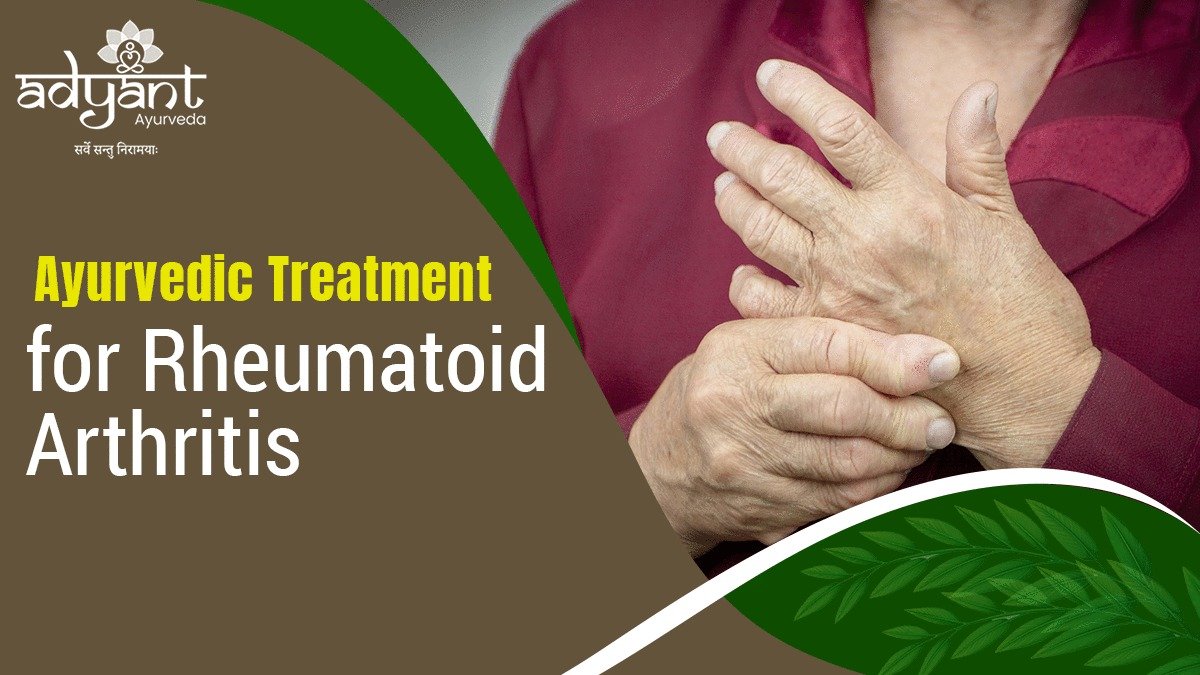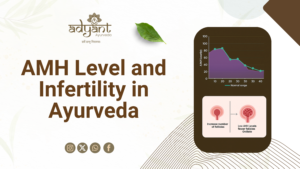Table of Contents
ToggleAyurvedic Treatment for Rheumatoid Arthritis (RA) – A Holistic and Evidence-Based Approach
Rheumatoid Arthritis (RA) is a chronic autoimmune disorder characterized by inflammation of the joints, leading to pain, stiffness, and reduced mobility. Conventional treatments often focus on symptom relief rather than addressing the root cause. Ayurveda, the ancient Indian system of medicine, offers a holistic approach by targeting the underlying imbalances in the body, especially the accumulation of Ama (toxins) and disturbance of Vata dosha.
📲 Book a Free Consultation
For a free consultation with top Ayurvedic doctors for Rheumatoid Arthritis, download our app from the Play Store “AyurCare“
At Adyant Ayurveda, treatments are tailored based on a patient’s Prakriti (body constitution) and Vikriti (current imbalance). This ensures therapies align with your unique physiology, improving effectiveness and minimizing side effects.
🔬 What is Rheumatoid Arthritis (RA)?
RA is an autoimmune condition where the body’s immune system mistakenly attacks the synovial membrane, causing joint inflammation, pain, and potential deformity over time.
🩺 Stages of Disease Progression in RA
Early Stage: Mild joint pain, stiffness, and fatigue due to synovial membrane inflammation.
Intermediate Stage: Increased pain, reduced joint mobility, and thickening of the synovial membrane.
Advanced Stage: Cartilage damage, bone erosion, and systemic complications.
🔍 Signs & Symptoms of RA
Tender, swollen joints
Morning stiffness
Symmetrical joint involvement
Fatigue, weight loss, fever
Rheumatoid nodules
Cardiovascular, respiratory, and psychological complications
🌿 Ayurvedic Perspective – RA as Amavata
RA is described as Amavata in Ayurveda, caused by:
Vitiation of Vata Dosha
Ama accumulation due to weak digestion (Mandagni)
Obstruction in Srotas (body channels)
🧠 Ayurvedic Diagnostic Tools
Samprapti Ghataka (Pathological mapping)
Involvement of Asthi and Majja Dhatu
Srotas affected: Rasavaha, Asthivaha, Majjavaha
Clinical metrics: Grip strength, walking time, ESR, RA factor
📊 Samprapti Flow:
Mandagni → Ama Formation → Vata Vitiation → Ama + Vata obstruction → Joint Inflammation = Amavata
🧾 Types of Amavata
Acharya Harita’s Classification: Vishtambhi, Gulmi, Snehi, Sarvangi
Dosha-Based: Vatanuga, Pittanuga, Kaphanuga, Tridoshaja
Duration-Based: Navina (<1 year), Purana (>1 year)
⚠️ Causes of RA in Ayurveda
Poor digestion (Mandagni)
Viruddhahara (incompatible food combinations)
Sedentary habits
Chronic stress and emotional instability
Hereditary tendencies and weak immunity
🧘♂️ Ayurvedic Treatment Approach
🎯 Core Principles
Balance Vata Dosha
Eliminate Ama
Rekindle Agni (digestive fire)
Strengthen Dhatus
🧴 Panchakarma for RA (Detoxification)
| Therapy | Purpose |
|---|---|
| Vamana | Removes excess Kapha and early-stage Ama |
| Virechana | Eliminates Pitta and inflammatory toxins |
| Basti | Restores Vata balance and nourishes joints |
| Raktamokshana | For severe joint inflammation and Pitta imbalance |
| Abhyanga + Sweda | Lubricates joints and relieves stiffness |
🛠️ Treatment Phases
Purvakarma (Preparatory Phase):
Deepana-Pachana with Trikatu and Guggulu
Snehapana with Mahatikta Ghrita
Swedana (Herbal steam)
Paschat Karma (Post-Therapy):
Gradual reintroduction of food (Samsarjana Krama)
Rasayana therapy: Ashwagandha, Amalaki, Bala
💊 Herbal Formulations and Classical Medicines
| Category | Formulations |
| Decoctions | Amruthotharam Kashaya, Rasnasaptaka Kashaya |
| Tablets | Kaishora Guggulu, Simhanada Guggulu, Triphala Guggulu |
| Oils | Dhanwantaram Taila, Narayana Taila, Eranda Taila |
| Lepas | Kottamchukkadi Lepa, Dashanga Lepa |
🧾 Common Protocols
Simhanada Guggulu + Eranda Taila for clearing Ama
Vatavidhvansak Rasa + Yogaraja Guggulu for chronic stages
Amavatari Rasa – 250mg TID (Shown to improve mobility in 8 weeks)
🧪 Scientific Evidence Supporting Ayurveda
WHO/ICMR Study (1977–1984): 290 RA patients showed significant improvement using classical Ayurvedic protocols.
IJAR Study (2011): Better grip strength, mobility, and reduced inflammation.
AYUSH Clinical Trial (2018): Panchakarma + Kaishora Guggulu protocol led to reduced ESR, improved pain scores in 12 weeks.
Case Report: 35% symptom improvement in a 1-year RA case after 8 weeks of Amavatari Rasa, without adverse effects.
🍽️ Diet & Lifestyle Recommendations
✅ Eat:
Warm, easy-to-digest foods (Moong dal, barley, old rice)
Bitter vegetables: Neem, Karela
Digestive herbs: Ginger, black pepper, turmeric
Herbal teas: Dashamoola, Triphala
❌ Avoid:
Cold, fermented, stale, and heavy foods
Dairy (especially curd), sugar, nightshades
Incompatible foods (milk + fish, curd + meat)
🧘 Lifestyle:
Daily Abhyanga (oil massage)
Light Yoga: Vajrasana, Ardha Matsyendrasana
Pranayama: Anulom Vilom, Bhramari
Avoid overexertion, late meals, and day sleep
🛡️ Preventive Care Tips for High-Risk Individuals
Vata-pacifying routine after age 40
Seasonal Panchakarma detox
Avoid a sedentary lifestyle and Viruddhahara
Regular yoga and stress management
💪 Long-Term Outcomes
Patients following classical Panchakarma + Rasayana protocols reported:
Long-term symptom remission
Reduced steroid dependency
Enhanced digestion and metabolism
No RA flare-ups for 6–12 months
🌟 Why Choose Adyant Ayurveda?
👩⚕️ Expert Team: Dr. Shree Lakshmi, Dr. Sumana, Dr. Vidya, Dr. Preethi
🏥 4 Centers in Bangalore: Jayanagar, Indiranagar, Kalyan Nagar, RR Nagar
📱 Online & Offline Consultations
🧴 Authentic In-House Ayurvedic Pharmacy
Rasayana Benefits – Preventive & Rehabilitative Focus
🌱 Role of Rasayana Chikitsa
Rasayana herbs like Ashwagandha, Amalaki, Bala, and Guduchi rejuvenate tissues, improve immune resilience, and prevent recurrence. Especially beneficial after detox, Rasayana supports long-term remission and strengthens Asthi and Majja Dhatus.
🏡 Ayurvedic Home Remedies for Rheumatoid Arthritis (Amavata)
1. Castor Oil + Dry Ginger Paste
How to use: Mix 1 tsp warm castor oil with ½ tsp dry ginger powder (Sonth). Apply to swollen joints.
Benefits: Reduces inflammation and stiffness by pacifying Vata and expelling Ama.
2. Turmeric Milk (Haldi Doodh)
How to use: Mix ½ tsp turmeric + a pinch of black pepper in 1 cup warm cow’s milk or almond milk. Take at bedtime.
Benefits: Anti-inflammatory (curcumin), improves immunity, and joint flexibility.
3. Fenugreek (Methi) Seeds
How to use: Soak 1 tsp of fenugreek seeds overnight. Chew on an empty stomach in the morning, or dry roast and powder them to consume with warm water.
Benefits: Reduces Ama, relieves joint pain, supports digestion.
4. Garlic Cloves (Lahsun)
How to use: Eat 1-2 raw garlic cloves on an empty stomach daily.
Benefits: Natural anti-inflammatory, reduces Vata, boosts immunity.
5. Triphala Churna
How to use: Mix 1 tsp Triphala powder in warm water and take before bed.
Benefits: Detoxifies intestines, supports Agni, helps prevent Ama formation.
6. Ajwain (Carom Seeds) Soak
How to use: Soak 2 tsp Ajwain in warm water and drink in the morning.
Benefits: Relieves joint pain, reduces digestive toxins, balances Vata.
7. Epsom Salt + Dashamoola Decoction Soak (for external use)
How to use: Mix 2 tbsp Epsom salt + 1 cup Dashamoola kwatha in warm water and soak feet/hands for 15–20 minutes.
Benefits: Relieves swelling, pain, and stiffness in joints.
8. Coriander + Cumin + Fennel Water
How to use: Boil 1 tsp each of coriander, cumin, and fennel in 1 liter of water. Strain and sip warm throughout the day.
Benefits: Enhances digestion, flushes Ama, mildly diuretic to reduce swelling.
⚠️ Note: These remedies are not substitutes for professional care. They should be used as supportive practices after consulting an Ayurvedic doctor at Adyant Ayurevda—especially for chronic RA cases.
🔚 Conclusion: Heal RA Naturally
Ayurveda provides a personalized, root-cause solution for Rheumatoid Arthritis. Through Panchakarma, herbal formulations, and Rasayana therapy, it enables deep healing, enhanced joint function, and improved quality of life.
📞 Book Now: Call 9972541009 or download the AyurCare App to get started.
❓ FAQs – Ayurvedic Treatment for RA
1. Can Ayurveda cure RA permanently?
Ayurveda targets root causes like Ama and Vata imbalance. Long-term relief and remission are achievable with full protocols.
2. How is RA diagnosed in Ayurveda?
Via Nadi Pariksha, Dosha-Dushya-Srotas assessment, and clinical symptoms like stiffness and indigestion.
3. What is the role of Panchakarma?
Panchakarma detoxifies and balances Doshas. Basti and Virechana are key in reducing joint pain and inflammation.
4. Best Ayurvedic medicines for RA?
Simhanada Guggulu, Kaishora Guggulu, Amavatari Rasa, Rasnasaptaka Kashaya.
5. Is it safe to combine Ayurveda with allopathy?
Yes. Ayurveda complements modern medicine and may reduce the need for steroids under expert supervision.
6. When will I see results?
Acute RA: 2–4 weeks. Chronic RA: 2–3 months, depending on severity and adherence.
7. Are there any side effects?
Minimal if prescribed by qualified Ayurvedic doctors. Natural, body-compatible herbs are used.
8. Can Panchakarma be done in all stages?
Yes, with customization. Acute RA requires gentle detox; chronic stages need full Panchakarma.
9. What foods should I avoid?
Nightshades, sugar, curd, incompatible combinations, and processed foods.
10. Where is the best Ayurvedic treatment for RA in Bangalore?
Adyant Ayurveda with 4 clinics and expert doctors offering personalized, holistic care.






